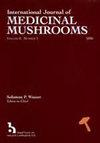甲壳素及其衍生物壳聚糖:自然界的分布、应用领域和技术研究(综述)
IF 1.4
4区 生物学
Q4 MYCOLOGY
International journal of medicinal mushrooms
Pub Date : 2024-07-01
DOI:10.1615/intjmedmushrooms.2024055012
引用次数: 0
摘要
本综述重点介绍了甲壳素/壳聚糖这种有望用于生物医学研究开发的生物聚合物。我们的目标是评估这些生物聚合物的实际应用潜力,并总结有关其生产和纯化的传统和创新技术的信息。甲壳素和壳聚糖在自然界中的广泛存在以及壳聚糖独特的化学和生物特性,使人们对后者在多个制药领域的应用越来越感兴趣。提取甲壳素并将其进一步改性成壳聚糖的主要阶段是脱蛋白、脱矿物质和脱乙酰基,壳聚糖纯化的主要方法是过滤、透析和再沉淀。用甲壳类动物和食用菌生产甲壳素/壳聚糖的利润率大致相同。使用农业或林业废料作为营养基质可以降低蘑菇产品的成本。因此,在森林地区利用真菌作为甲壳素/壳聚糖的来源是一个相当有前景的问题。本文章由计算机程序翻译,如有差异,请以英文原文为准。
Chitin and Its Derivative Chitosan: Distribution in Nature, Applications Realm, and Technology Research (A Review)
The present review highlights the chitin/chitosan as biopolymers that are promising for biomedical research development. Our goal was to assess the potential for practical use of these biopolymers and to summarize information on traditional and innovative technologies for their production and purification. The widespread occurrence of chitin and chitosan in nature as well as the unique chemical and biological properties of chitosan are reasons of growing interest in the use of the latter in several pharmaceutical fields. The main stages of chitin extraction and its further modification into chitosan are deproteinization, demineralization, deacetylation, and the main methods of chitosan purification are filtration, dialysis and reprecipitation. The profitability of the production of chitin/chitosan from crustaceans and edible mushrooms is approximately at the same level. The cost of mushroom products can be reduced by using agricultural or forestry waste as nutrient substrates. This makes the use of fungi as sources of chitin/chitosan in forested regions a rather promising issue.
求助全文
通过发布文献求助,成功后即可免费获取论文全文。
去求助
来源期刊
CiteScore
2.60
自引率
16.70%
发文量
91
审稿时长
6-12 weeks
期刊介绍:
The rapid growth of interest in medicinal mushrooms research is matched by the large number of disparate groups that currently publish in a wide range of publications. The International Journal of Medicinal Mushrooms is the one source of information that will draw together all aspects of this exciting and expanding field - a source that will keep you up to date with the latest issues and practice. The International Journal of Medicinal Mushrooms published original research articles and critical reviews on a broad range of subjects pertaining to medicinal mushrooms, including systematics, nomenclature, taxonomy, morphology, medicinal value, biotechnology, and much more.

 求助内容:
求助内容: 应助结果提醒方式:
应助结果提醒方式:


